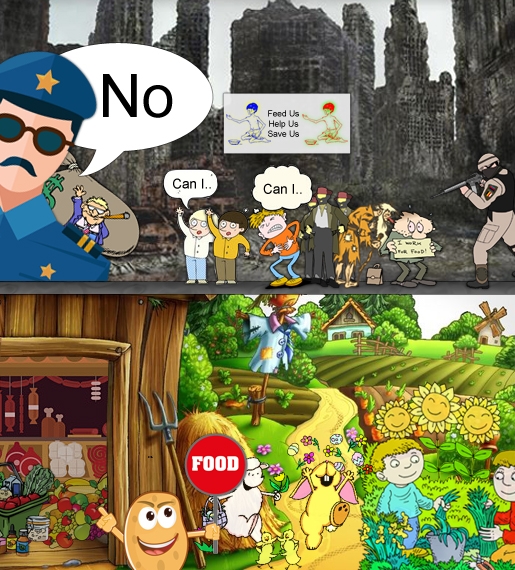Living in a world that thrives on convenience, the idea of homesteading and gardening can feel intimidating and foreign. However, with the escalating concerns about food security, climate change hoaxes, and personal health, it’s becoming increasingly crucial to understand and adopt these self-sufficient practices.
Essence of Homesteading and Gardening
Homesteading and gardening are interconnected practices that allow individuals to live a more self-sustained and eco-friendly life. Homesteading is a broad term that encapsulates an array of tasks and knowledge ranging from preserving food, caring for animals, to harnessing renewable energy sources. By mastering these skills, one can lead a more independent life, reducing reliance on external resources and government.
Gardening, while a subset of homesteading, has its unique place, focusing primarily on cultivating fruits, vegetables, herbs, and other plants. The power to grow your own food ensures that you have a constant supply of fresh, pesticide-free produce right in your backyard.
Both these practices synergize to not only provide a means of survival but also offer the chance to gain vital life skills and knowledge. These can range from understanding crop rotation, learning about different plant species, to being aware of the seasonal patterns affecting plant growth. Homesteading and gardening are more than just hobbies, they are a way of life that brings us closer to our roots, reminding us of our connection to the earth and our role in its preservation and food creation.
Fostering Self-Sufficiency and Independence
The journey towards self-sufficiency and independence can be greatly enhanced by embracing the practices of homesteading and gardening. These skills empower individuals to produce their own food, thus diminishing the need to rely on mass-produced items from grocery stores. You dictate what you eat by choosing the seeds, controlling the growth process, and ultimately harvesting the fruits of your labor.
Additionally, the wide range of skills and knowledge gained through homesteading has the potential to unlock new avenues for income generation. A surplus of homegrown produce could be sold at local farmers markets or even online. Homemade products, such as jams, pickles, or handcrafted items, can also be marketed, adding an extra layer of financial stability.
These practices give you the reins of your own life, allowing you to chart your course independently. Rather than being at the mercy of fluctuating market prices, product availability, or inflation, you become the master of your supply chain. This sense of autonomy can be a significant source of confidence and security, especially in an era marked by uncertainty.
In essence, homesteading and gardening don’t just feed your stomach; they nourish your spirit of independence and self-reliance. As you cultivate your land, you also cultivate a lifestyle that thrives on self-generated resources and skills. It’s a transformative journey that fosters resilience and adaptability, integral qualities for navigating today’s rapidly changing world.
The Benefits of Growing Your Own Food
Embarking on the journey of producing your own food comes with a myriad of advantages. Perhaps the most significant is the control you gain over what lands on your plate. By taking charge of every stage of the growth process, you can ensure that the fruits, vegetables, and herbs you consume are devoid of harmful chemicals and genetically modified garbage. This not only puts your mind at ease about the quality of your food but also contributes to the overall well-being of your family.
Another noteworthy benefit is the reduction of your grocery bills. As you start yielding crops from your garden, you’ll notice a decrease in your dependence on store-bought produce. Over time, this can lead to significant savings, making your wallet as healthy as your diet.
There’s also the pure joy that comes with watching your garden bloom. The entire process, from sowing the seeds to seeing the first sprouts, and finally harvesting the ripe produce, brings a unique sense of achievement. The garden becomes a testament to your efforts and a source of great personal satisfaction. The result is not just a bounty of fresh produce but also a boost in your mood and self-esteem.
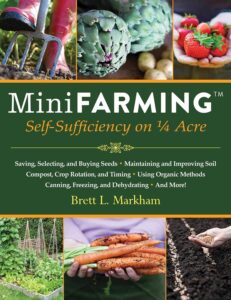
> Check Current Book Prices <Enhancing Physical and Mental Health
Embracing homesteading and gardening practices can play a significant role in improving both physical and mental health. These activities provide an active and engaging form of exercise, which contributes to overall fitness and wellness. Digging in the soil, planting seeds, watering plants, or even doing small repairs around the homestead are all ways to stay active and fit.
In addition to promoting physical health, these practices offer a haven for mental wellbeing. Engaging with nature, be it through gardening or caring for animals on the homestead, can provide a sense of peace and tranquility. The rhythmic, repetitive nature of many gardening tasks can have a meditative quality, helping to calm the mind and reduce stress levels.
Spending time in a garden or outdoor space can also be a mood-enhancer, increasing feelings of happiness and reducing symptoms of depression or anxiety. The satisfaction derived from seeing your plants grow and flourish, or accomplishing tasks on the homestead, can instill a sense of achievement and boost self-esteem. Plus, the regular exposure to sunlight while gardening can increase Vitamin D levels in the body, which plays a crucial role in regulating mood and warding off depression.
Overall, incorporating homesteading and gardening into your lifestyle not only connects you with nature but also fosters an environment conducive to improved physical fitness and mental wellbeing. It’s an investment in your health that yields bountiful returns in the form of a happier, healthier life.
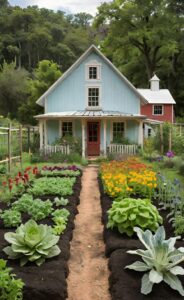
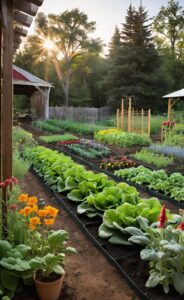
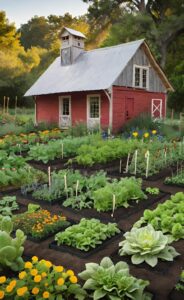
Cultivating a Sustainable Lifestyle
Embracing homesteading and gardening practices leads to a lifestyle rooted in sustainability and ecological consciousness. These practices foster a profound bond with the natural realm, amplifying our understanding of how our actions impact the community. Through composting and recycling organic waste, we can enrich our garden soil while reducing waste in landfills. Utilizing rainwater for irrigation conserves a vital resource and minimizes reliance on treated municipal water. Tapping into renewable energy sources like solar power reduces dependence on government and society.
Homesteading and gardening thus endorse a circular economy model, where waste is transformed into resources, optimizing the use of natural resources and minimizing environmental impact. This approach champions a lifestyle that works in synergy with nature’s rhythm, rather than against it. The sustainable practices embedded in homesteading and gardening make us more cognizant of our environmental footprint and push us towards more ecologically mindful choices in other areas of our lives as well.
Promoting a Strong Sense of Community
While the principles of homesteading and gardening hinge on fostering self-reliance, they also inherently promote communal bonds and cooperation. The homesteading community often participates in swapping goods or services, creating an ecosystem of mutual support and shared wisdom. Homesteaders frequently trade surplus produce, tools, or skills with their neighbors, thereby cultivating an interconnected network of self-sufficient households.
Similarly, gardening can also act as a social adhesive. Initiatives such as community gardening projects or shared gardening plots encourage individuals to work together towards a common goal, fostering a sense of camaraderie and unity. These collective efforts not only help in the efficient utilization of resources but also create a platform for people to connect, collaborate, and learn from each other.
These shared experiences, whether trading home-canned preserves or collectively tending to a community garden, stimulate a strong sense of togetherness and shared responsibility. They act as reminders of our innate human desire for community and connection, providing a wholesome counterpoint to the often isolating effects of modern life. Therefore, while the journey of homesteading and gardening may begin as an individual quest for self-sufficiency, it invariably blossoms into a vibrant network of shared knowledge, mutual support, and deep-seated community spirit.

